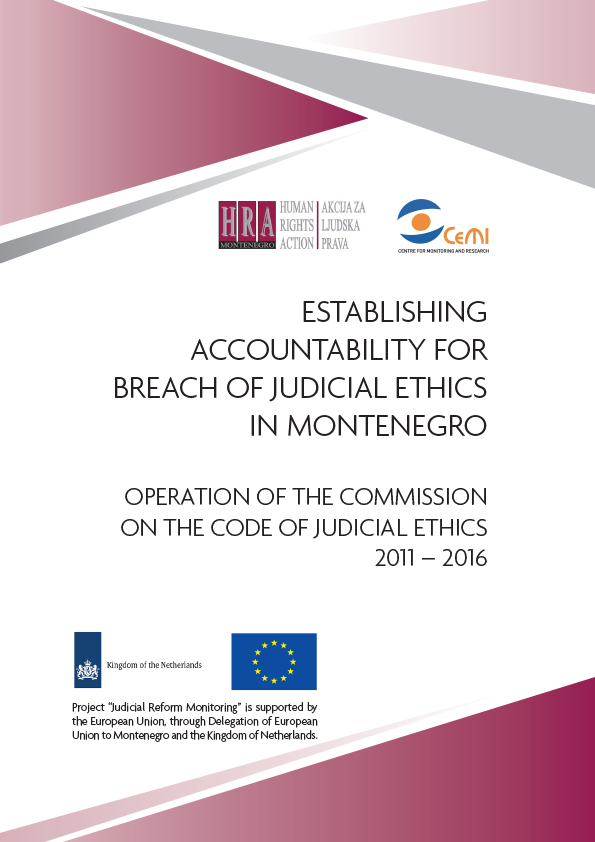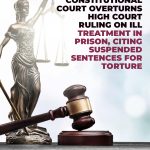Models of deinstitutionalization and methods of protecting mental health in community
10/03/2017
ESTABLISHING ACCOUNTABILITY FOR BREACH OF JUDICIAL ETHICS IN MONTENEGRO, OPERATION OF THE COMMISSION ON THE CODE OF JUDICIAL ETHICS 2011 – 2016
20/03/201715/3/2017 A GROWING TREND OF TOLERATING TORTURE: TRIAL AGAINST AECS OFFICERS FOR PRISONER ABUSE DELAYED FOR MORE THAN A YEAR
Human Rights Action (HRA) protests an enormous delay in administration of justice in the case of torture of prisoners at the Administration for Execution of Criminal Sanctions (AECS) in January 2015.
Following more than two years of torture of prisoners and more than a year of scheduling the start of the trial against prison guards, the proceedings did not actually start to date for as many as 13 of the 14 hearings (sessions during which the trial was supposed to take place) were postponed, while as regards the hearing scheduled for 7 February 2017 – we do not know whether it has been held or not. HRA suspects that the consequence of such long delay is a deliberate obstruction of trial.
As a reminder – after the incident that took place in AECS on 14 January 2015, in which nine inmates attacked prison guards and caused grievous bodily harm to some of them, the guards carried out systematic torture against at least 13 prisoners. The Ombudsman found that 13 prisoners had been ill-treated, three of them even tortured, and that one of them had been hit as many as 46 times with blunt force.
The indictment against 10 AECS security officers was raised in December 2015 and the trial was scheduled to begin on 22 February 2016, but was then postponed for the first time – for reasons unknown to us, and has been postponed ever since.
On the other hand, the first instance trial against inmates for assaulting the guards was completed in a little less than a year, and inmates were imposed a final sentence within one year and nine months.
The prisoners were also instantly accused, within only twenty days, as opposed to the guards, who were charged only more than ten months after the torture had taken place.
One of the conclusions of HRA report “Prosecution of torture and ill-treatment in Montenegro” published in 2013 is that investigations and trials for ill-treatment and torture in Montenegro – if conducted at all – last too long, and, as a consequence, prosecution often becomes time-barred, which had until then occurred in three such cases.
We also wish to recall that no person has been indicted for beating of 18 detainees in AECS on 1 September 2005, while only one person was under investigation for criminal offence Negligent performance of duty. For years the Supreme State Prosecutor’s Office kept rejecting HRA’s request to inform the public about measures taken to prosecute all responsible members of the special police unit and the Police Administration who had ordered and put into effect this action. There was no effective investigation on this occasion despite an explicit appeal of the EU to implement one.
In 2015 in the case of Milić and Nikezić v. Montenegro, the European Court of Human Rights held that Montenegro violated the European Convention on Human Rights because the state prosecutor had acted contrary to the international standard of prohibition of torture by declining to prosecute ill-treatment of two prisoners by the guards.
Taking into consideration the assault on citizens by police officers after the protest in October 2015 that also went unprosecuted, it is quite obvious that there is a growing trend toward tolerance for torture by state officials in Montenegro.
In all this, the Ministry of Justice is not ready to accept recommendations addressed to Montenegro in 2014 by the Committee against Torture to envisage harsher punishment and remove time-bar prescribed for such offences, as has been recently proposed by HRA at the public hearing on Draft amendments to the Criminal Code.
APPENDIX:
Hearing dates in the trial against AECS guards:
- 22 February 2016 (postponed – we do not know the reason);
- 22 March 2016 (postponed due to the absence of one of the accused, Duborija, who was allegedly unable to attend the trial for health reasons);
- 13 April 2016 (postponed because defence attorney sought exemption of judge Keković, who adjudicated in the proceedings in which most of the accused had the damaged party status);
- 14 September 2016 (postponed because accused Duborija and Nikčević were absent due to their participation in the Judicial sports games in Ohrid);
- 3 October 2016 (postponed – we do not know the reason);
- 10 October 2016 (postponed – we do not know the reason);
- 26 October 2016 (postponed – we do not know the reason);
- 5 December 2016 (postponed – we do not know the reason);
- 21 December 2016 (postponed because attorney Mićanović was unable to come to trial for health reasons);
- 16 January 2017 (postponed – we do not know the reason);
- 6 February 2017 (postponed – we do not know the reason);
- 7 February 2017 (we do not know whether the hearing took place or was postponed);
- 14 March 2017 (postponed as several guards did not come to trial because they allegedly did not receive a summons (apropos, in trial the judge said that in her files there was a document proving that the summons had been properly delivered, and one guard did not come to trial because it was said that he was in treatment);
- 15 March 2017 (postponed because the damaged prisoners were not escorted from AECS);
- Trial will, perhaps, continue on 27 March, as scheduled.







 English
English